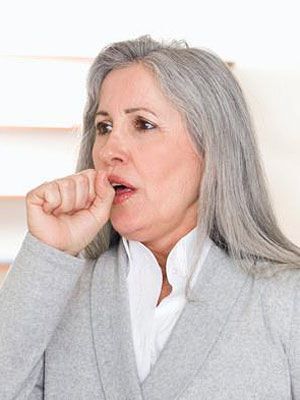Each year, the cooling temperatures, falling leaves, and changing season remind us to get vaccinated against COVID-19 and the flu. But if you’re an older adult, there’s another serious health threat you should be aware of: respiratory syncytial virus, or RSV.
RSV can affect people of all ages. Each year, between 60,000-160,000 older Americans are hospitalized for RSV and 6,000-10,000 die due to RSV infection.

Senior Woman Coughing
The good news is there’s a vaccine available to help protect seniors who are most at risk for severe RSV disease. The Centers for Disease Control and Prevention (CDC) recommends all adults age 60+ talk to their doctor about whether the RSV vaccine is right for them.
Respiratory syncytial virus (or RSV) is a common respiratory virus that affects the lungs and breathing passageways. It typically causes mild, cold-like symptoms. Like COVID and the flu, RSV is highly contagious. It spreads in two main ways: 1) By coming into contact (via mouth, nose, or eyes) with droplets from another person’s cough or sneeze, or 2) By directly touching a surface that has the virus living on it (e.g., a door handle), and then touching your face.
While most people recover from RSV within a week or two, some are more likely to develop serious illness and complications. This includes older adults and infants age 6 months or younger.
RSV symptoms in adults usually start within four to six days after getting infected with the virus. Signs of infection are similar to those of a common cold and may include: fever, runny nose, congestion, sore throat, sneezing, wheezing / barking cough, & loss of appetite.
According to CDC, adults at highest risk for RSV complications include: 1) those age 60+, 2) People who live in long-term care facilities (e.g., nursing homes), 3) people with chronic medical conditions such as: diabetes, heart, liver, or kidney disease, weakened immune system, hematologic disorders, or neurologic/neuromuscular conditions.
Two single-dose vaccines are currently approved by the FDA to help prevent severe RSV in adults: Arexvy by GlaxoSmithKline (GSK) and Abrysvo by Pfizer. These vaccines are recommended by CDC for people age 60+, “using shared clinical decision-making.” Shared decision-making is a process in which doctors and patients work together to decide the best course of action for that patient’s health.
The RSV vaccines are reported to be highly effective in preventing severe RSV infection. A single dose of vaccine protects against RSV disease in adults age 60+ for at least two winter seasons. In trials, both RSV vaccines were 83%-89% effective in preventing RSV-related lung infections during the first RSV season after vaccination.
If you have Medicare Part D, your plan should cover the RSV vaccine at no out-of-pocket cost to you. If you receive your drug coverage through your employer or another provider, check your plan to see if the RSV vaccine is covered.
In addition to getting vaccinated, there are smart steps you can take every day to reduce your chances of an RSV infection: 1) Wash your hands thoroughly and frequently, 2) Cover sneezes and coughs (with a tissue or sleeve, not your hands), 3) Avoid touching your face before washing your hands, 4) Avoid close contact with people who are sick, 5) Clean common surfaces often at home and/or at work, & 6) Stay home if you’re feeling ill.
Stay healthy by staying up to date on your vaccines! Getting routine vaccinations is a vital part of aging well. One reason is that we cannot fight off viruses as effectively as we age, which makes us more vulnerable to preventable illnesses like RSV, COVID-19, and influenza. Article courtesy of National Council on Aging.
